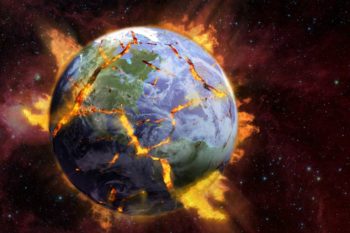Looking Forward to Re-Creation in Eternity
I owe E. Stephen Burnett some public thanking. First because he asked me to take this regular Thursday slot on Speculative Faith, which I’ve used to talk about what I want to talk about. Second because he sincerely strives to be a decent person in how he treats me and others (which isn’t to say he’s a perfect person, but who is?) And third, because sometimes he says some things I sharply disagree with, but which get me to thinking in a way that in the end benefits me by getting me to clarify and solidify things I’ve been thinking for decades. Such as what I’m going to post about today. What I’m calling Re-Creation.
Randy Alcorn on Heaven
E. Stephen has posted numerous times on Speculative Faith about what heaven will be like (such as: Heaven Will be the Happiest Place on Earth, The Top Six Myths we Believe About Heaven, When You Long For New Earth, Start Biblical and ‘Normal,’ Then Dream Bigger) His thinking has been influenced by Randy Alcorn’s book Heaven and Alcorn’s thought in general (as set forth for the public by Eternal Perspectives ministries) as evidenced by a post E. Stephen did on Heaven all the way back in 2011.
Alcorn in short believes the New Heaven and New Earth will be substantially like the Planet Earth and heavens we have now–only without sin. He has applied certain passages of the Old Testament that most Dispensationalists say belong to the Millennial period as pertinent to what he believes eternity will be like. Perhaps he was correct to do so, because while I do believe in a literal Millennium of Christ’s rule, perhaps conditions in eternity will parallel the Millennium–or perhaps they will not. That “perhaps not” is really the center of my disagreement on this topic.
If you want to look at a rather detailed and technical-about-the-Bible view of my main disagreement with Alcorn and E. Stephen, check out what I say in the comments section of When You Long For New Earth, Start Biblical and ‘Normal,’ Then Dream Bigger. In short, I think there’s a degree of uncertainty about future things and so there’s a range of things that could be true. The concept of “Start Normal,” as in the New Heaven and the New Earth of eternity (Rev. 21) being highly similar to the Earth we know today (well, actually an update of this Earth, according to Alcorn and E. Stephen) is a possibility, I would say. But its also possible the New Earth will be dramatically different from the Earth as we know it–in fact, the Bible drops a few hints that could be interpreted as it being dramatically different (e.g. the Bible seems to say neither darkness nor sunshine will exist in eternity–which is nothing like the Earth we know: Revelation 22:5).
It’s possible to overstate the differences between Randy Alcorn/E. Stephen Burnett and me. I agree the Bible clearly teaches some similarities exist between the New Heaven and New Earth and the heaven and earth we know. I agree that the New Heaven and New Earth in essence undo the curse of Genesis chapter 3 and point back to the blessing of the Garden of Eden, fulfilling God’s original purpose in the creation of the universe (Rev. 22:2-3). However, it’s entirely possible from my point of view for this current world to be completely wiped out and then created once again and still fulfill God’s plan for the creation of the universe. God has the power to utterly obliterate, then bring back from nothing. Re-Creation, if you will.
Will This World be Destroyed?
In fact, this parallels what happens to some people who die–sure, some people leave bones in a grave that could be dug up and examined. But others, due to exceptional circumstances, are destroyed in death in a way you could not find the tiniest scrap of that person anywhere–all the constituent molecules and atoms are completely separated from one another and absorbed into other things. Yes, God knows what became of all those atoms and molecules, but when he re-assembles a person in the resurrection, does it really matter if God will use all the exact same atoms that were in your body? Couldn’t the carbon, oxygen, hydrogen (etc) atoms you will be made of be drawn from physical substances which never part of any human before? Wouldn’t the end result would be just the same? Wouldn’t that be rather like God making Adam from the dust of the earth in the first place?

Image source: Bible info dot net
Likewise, is it really important if this world will be entirely destroyed before God’s “Re-Creation” of a new one? What’s the difference between letting part of the planet survive and re-building it versus wiping all out and engaging in re-creation? I don’t see any important difference.
So all that matters is what the Scriptures say God will do…and the Scriptures don’t say with crystal clarity from what I see. I think II Peter 3:10-12 implies complete destruction of all things, including the destruction of chemical elements in verse 12 and beginning over. Mr. Alcorn insists II Peter 3:10 prevents the Earth from being destroyed because the “best Greek text” says the Earth will be “laid bare” or “exposed” instead of “burnt up.” I think relying on one Greek text, even if the best, is in general not a good idea–even if I for sake of argument concede his preferred text might be the best in this place. Revelation 21:1 says the old heaven and earth will “pass away”–whatever that means, but that seems to imply they won’t be hanging around in any significant way. Isaiah 65:17 says God will create a new heaven and new earth–and the former things will not be remembered, which by referencing forgetting the “former things” seems to be saying the new work will not be connected to the past. As a re-creation. Or that’s one way to read it.
Psalm 102:25-26 talks about changing the heaven and the earth like changing clothes–which seems to show the New Heaven and New Earth are of a similar pattern as the old, but are new in substance (new clothes may be similar to old clothes, but are literally something physically different from the old). Isaiah 51:6 likewise talks about the old earth wearing out like clothes–in contrast to God’s salvation, which is eternal (and which will be expressed in the re-creation of new earth, according to elsewhere in Isaiah).
All of these could in fairness be read in more than one way. God could in effect heal a sick Planet Earth, like healing a person struck with leprosy. Or could in effect raise the planet from the dead by reassembling every single particle, as will happen with certain human bodies which have been completely destroyed. And what’s the difference? None really, except a healed patient will presumably not become a superbeing of some sort. The healing will only go up to “normal” but not beyond–but could go beyond if God chose to perform that type of re-creation.
So will this current Planet Earth endure, only to be majorly renovated? Or will it be replaced, like a new piece of clothing? I’m not sure–furthermore I don’t think it matters–and object most to insisting this is some point of massive importance. If the physical continuity of this creation into eternity were of extreme importance, the Scriptures would have stated things more clearly.
But on a Personal Level, Why do I Like the Idea of Re-Creation?
Having presented an intellectual case as to why I don’t know for sure if Randy Alcorn (or E. Stephen Burnett) is right about the New Heaven and New Earth, there’s another element here if I’m fully honest with myself. I don’t want Alcorn to be right. I don’t want heaven to be “normal.”
The reason starts, as with so many things for me, as a teenager voraciously reading science fiction (with some fantasy on the side). And running into a lot of the skepticism about any Christian worldview from the science fiction writers. Robert A. Heinlein specifically criticized the very idea of heaven by asking if there was anything at all anyone could do that you’d like so much that you’d want to do it eternally? For ever? “Won’t you get bored?” asked Heinlein.
As a teen who at that point knew I believed in God and Christ even though I hadn’t been to church since age eleven, someone who hardly knew the Bible at the time, I first tried to answer this by wondering if eternity might be a timeless state. Perhaps we will live in one eternal moment of joy, I was thinking. An idea itself influenced by concepts of time being flexible I borrowed from science fiction. But that idea doesn’t square up very well with how people are described as actually doing things in eternity. Such as events around the throne of God in Revelation or the description of the Tree of Life in Revelation 22 giving 12 fruits in its season (a clear reference to the passing of time). Things I learned about later.
But I realize now, thanks to E. Stephen Burnett’s steady dropping of posts on this topic over a long period of time, which caused me to confront my own thinking, that I in fact have carried with me a science fictiony view of heaven into my subsequent very serious study of the Bible. That I have carried with me an expectation that there will be a science fiction aspect to heaven–there will be things about it which are very much unexpected, surprising, shocking. That God will place us into a world unlike our own, one that will delight us with its freshness and cause our minds to be filled with awe and wonder. A very complex and intricate “otherness” that will never wear out, even over the vast stretches of eternal time. Because God will make his re-creation so complex and so beyond our ordinary experience.
My Emotional Longing for the Strange
The idea of being surprised about what God has in store for us in eternity is so appealing to me and the idea of “Earth 1.2” is so unappealing, that this lead me to some further self-discovery.
You see, with certain exceptions, I don’t like urban fantasy very much. And I think superhero stories, while they can be interesting at times, are far from the most interesting types of speculative fiction stories.
I am at heart a xenophile. Even though I find comfort in familiar things at times, I am most interested in things that are unfamiliar and unusual. Or exotic.
In particular, in a speculative fiction story, I expect to be dropped into a story world unlike what I’ve read before. I don’t like returning to the same type of setting over and over again. Which explains why I usually don’t read long series of fantasy books that keep returning to the same imaginary universe over and over again. I don’t like that–I want new imaginary worlds.
So I don’t actually want to think of the New Heaven and New Earth as “normal.” Normal is not fun or interesting! I want a re-creation, an eternity with familiar touches, but which overall is completely unlike anything I’ve ever experienced!
This bit of my internal makeup may relate to why I find a great deal of stories by fellow Christian speculative fiction writers lacking in the story setting department…because I want a story world to be unexpected and odd, not warm and familiar…
Longing For the Familiar
Having said that, I do love certain places, foods, and people from my past. I can understand wanting to see them again in eternity.
So I assume that my occasional longings for familiarity coupled with a general preference for novelty are flipped in most people. Most people occasionally want novelty but generally prefer nice things they are familiar with. A favorite restaurant, a favorite pet, friend, food, and place. Favorite art.
And this is what Alcorn is offering, at least in part. He’s imagined a vision of heaven that isn’t strange and off-putting for many people. He instead has focused on aspects that resonate with our past and suggests heaven will be full of the best of this life…with a slice of the unknown added to spice things up a bit. Which is pretty much exactly like the title of E. Stephen Burnett’s post on starting normal when thinking of heaven, then dream bigger.
But I want to start with a big dream of a re-creation that’s mind-blowing, then add familiar slices afterwards.
Heaven Both Strange and Comforting
The four-faced alien-looking seraphim will sing in heaven, we know this for sure. The Bible describes transparent gold in the New Jerusalem, iridescent gates made of what appear to be a single pearl, foundations of shining gemstone light, and all darkness disappearing. The massive city of New Jerusalem would jut out of the atmosphere–yet people seem to breathe there with no trouble.

Four seraphim faces: Image source: Quora
The kings of the earth will enter in and bring their glory–what that means exactly I don’t know. And furthermore am happy not knowing.
But on the other hand, heaven will also feature people we know and love, saints from served God in the past, singing in a heavenly chorus, praising God, eating the fruit of the tree of life (and perhaps other things to eat), pure water to drink (and perhaps other things to drink).
Will we remember the art of this world and be able to re-create it, but even better? Maybe. Will we have the literal art of this world just as it is now? I doubt it, but maybe. Will we have our pets and trees we climbed in and vistas we once enjoyed? I don’t know. Maybe.
Renovation or Re-creation?
Will the baseline of heaven be a renovation of what we have now, or a re-creation of something almost entirely new? I would say I don’t know for sure, not enough definite information is given by the Bible. But certainly God will comfort all of us, no matter who we are. Perhaps our personalities will change even–in fact it’s certain they will to get rid of sin, but perhaps even more than that.
But personally, I’m hoping for a re-creation. An eternity with a lot more unfamiliar things than we’ve been told about. A place stranger but also more marvelous than we can imagine. A place sharing a lot in common with mind-blowing science fiction and fantasy…
Conclusion
So what do you think, dear reader? What kind of thing would you most like to see in heaven? Are you looking forward “re-creation” (my made up word)? Or are you more interested in seeing the familiar, beloved things of this world again in eternity?
(Note the Army Reserve will have me out of town for the next 5 weeks. I’ve arranged for some friends to post in my place, though. 🙂 )








































Me, I fall into the camp where I think that most fundagelicals are useless BECAUSE they spend so much time faffing around about the End Times and the New Whatever when things are fixed without them having to work at it.
Most of them have lost whatever street cred they try to maintain by keeping the same name as the 19th century evangelicals that advocated for slavery abolition and prison reform and child welfare reform, because most of them have been sucked into the authoritarian party (now performed by the GOP) where continuing improvements to labor, prison systems, child welfare, and also plus environmental concerns are bulldozed over in favor of cancer-stage capitalism to concentrate the money and power in the oligarch class.
Fun fact: Do you know why the US hasn’t ratified the UN convention on the rights of the child? Because fundagelical kooks like Michael and Debbie Pearl (who are also sexist like WHOA) want children to be beaten without legal repercussions (because “Biblical”) rather than finding better and more effective methods for child rearing. (I was spanked as a child, and not cruelly, but I think there are better methods. My parents even stopped spanking my youngest sibling earlier than the rest of us, and I’m not resentful about it.)
What’s interesting on the discussion of child raising methods are how ethical rules about psychological studies are conducted actually prevent double blind experiments where you’d deliberately separate identical twins and spank one and not the other but otherwise raise them in identical conditions. You’d also want to test different methods of spanking, if you wanted a scientific answer. Since that’s not ethical, there is no actual scientific answer to this question, believe it or not.
Studies today tend to contrast all punishment versus all positive reinforcement, do very poorly about correcting for genes and social class, do virtually nothing to discern between spanking done under control and physical abuse, and overall qualify as dumpster trash (with a few bits worth picking out).
There is real evidence in favor of spanking, but it’s in a way anecdotal (because many other factors are involved) but the use of judicial caning in Singapore has produced an extremely clean, orderly, and decent society. It’s been known to work in other places as well…anecdotally.
I’d say it’s a no-brainer that pain is a deterrent–that’s why God created it. Or from the point of view of the sophomoric thinkers who seem to think pain has no instructive value, that’s why pain evolved. Why modern man suddenly believes people learn nothing from pain, in spite of thousands of years of human experience to the contrary, I don’t know. Well, part of it is a kind of arrogance about how modern we are and how much we’ve learned over the primitive past…as we trip over ourselves to make mistakes of the past…
But anyway, you can tell I’m not overly heartbroken about the UN convention about the rights of the child. There are a number of conventions the USA has never signed–including the most updated Geneva convention rules. Including the protocol on landmines, which bothers me a bit more than UN rules on corporal punishment. Because kids losing limbs to landmines in Afghanistan, etc.
As for things Evangelicals have accomplished, a tremendous amount of money goes out of Christian pockets to Third World places to support various forms of ministries. Most of which are primarily paying ministers and missionaries, but also at a minimum give some charitable donations. And sometimes give a lot. Plus there’s Samaritan’s Purse who more directly gives aid. And a number of other Christian-based NGOs who help people overseas. Overall, Christians give money that winds up helping people at rates that far exceeds non-Christians…who, with a number of important exceptions, generally expect help for the poor to be paid for by taxes.
I think a natural cause for modern Evangelicals to fight against would the modern traffic in slave trade, most of it sex slavery. While there have been a few voices that talk about this a bit, mostly we’ve done nothing much. Christians have probably pushed harder against drug trafficking–not that drug trafficking doesn’t get people killed in places like Central America. And again, Afghanistan. But overall, not as worthy a cause. At least though Christians are mostly (mostly) not contributing to drug trafficking by using illegal drugs. That’s something worthwhile, if not spectacular.
We also have taken a stand against abortion, which you think is good, Notleia, but which I think is horrific.
But anyway, yeah, there’s always been a wing of Christians of all times waiting for Jesus to return. Which is a good thing in my opinion. If you don’t think that way for real, you start thinking about how you need to take over political parties to ensure your comfortable way of life continues, instead of fighting for good all your life and not worrying so much what happens to you personally, because the Lord will take care of that in the future when he returns.
But I guess that take-over-a-political-party-so-I-can-stay-comfortable thing has already happened to a degree, hasn’t it?
I think you’ve got a point here.
Taking another snippet of Scripture, ”There will be no more sea.” Unless people can come up with some metaphorical way to explain that, even if the earth is the same physical matter, that’s a lot of rearranging going on. But not a flood this time, and I have no idea how fire achieves that.
Travis, I don’t know how this helps or hurts your case, but here’s 2 Peter 3:10-13 from the CLNT:
“Now the day of the Lord will be arriving as a thief, and which the heavens shall be passing by with a booming noise, yet the elements shall be dissolved by combustion, and the earth and the works in it shall be found. At these all, then, dissolving, to what manner of men must you belong in holy behavior and devoutness, hoping for and hurrying the presence of God’s day, because of which the heavens, being on fire, will be dissolved, and the elements decomposed by combustion! Yet we, according to His promises, are hoping for new heavens and a new earth, in which righteousness is dwelling.”
Let me know what you think and I hope you get to see this comment before your 5 weeks away begin.
The translation you’ve listed is in accordance with what I think I see in the Greek. Only the use of the word “combustion” strikes me as an odd choice.